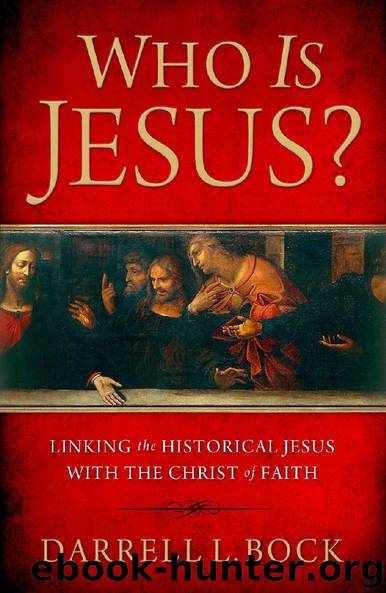Who Is Jesus? by Darrell L. Bock

Author:Darrell L. Bock
Language: eng
Format: epub
Publisher: Howard Books
THE MEANING OF THE EVENT
Jesus Protests Against the Injustice of the Priests in Terms of Monetary Gain
So what did Jesus’ act mean? At the very least, it was a protest against the way things were being done at the temple. Some argue that it was not a protest about any type of corruption in the way the money and commerce were being handled. 14 This is in reaction to an older common view, triggered in part by Jesus’ remark that the temple had become a “den of robbers.” The major point made in excluding the commerce is that supplying sacrifices was a requirement of the Law, which is true, and that Jesus makes no direct remark against those handling the money. The question is not if commerce needed to be conducted, but how it was done and who controlled it, so when Jesus protests the turning of the temple into something it should not be, he is complaining against the priests who oversee it. Everyone knew who oversaw the temple, so Jesus did not need to be explicit. Yet only by denying that Jesus alluded to Jeremiah 7:11 and the den of robbers can one exclude some allusion to either corruption or commerce as part of the point. 15
One should not reject Jesus’ use of this theme. First, throughout his ministry Jesus argued that the leadership and Israel were in a low spiritual state, comparable with other spiritually dry times in her history. It is the premise of his call to repent, rooted in Markan sources (Mark 1:14–15), but appearing also in L material (Luke 13:1–5; 15:7). The comparison with the low spiritual time of Elijah and Elisha or with a line of prophets is multiply attested, so much so that some people thought of Elijah when they heard about Jesus (Mark: Parable of the Wicked Tenants; Mark 8:28 = Matthew 16:14 = Luke 9:19; L: Luke 4:24–30, 7:16, 13:33; John: John 4:19, 7:52). The time is like that of people without a shepherd, an allusion to Ezekiel 34 and exile (Mark 6:34 = Matthew 9:32). Jerusalem is on the edge of an exile-like judgment (Matthew 23 = Luke 11:37–54; the Olivet Discourse of all the Synoptics). So such a perspective runs deep in the teaching of Jesus, touching all its traditional strands.
Second, others shared in this charge against the leadership. The Qumran community argued that the “wicked priest” who served as an ancestor to the current priesthood amassed wealth at others’ expense (1QpHab 8:7–13 commenting on Habakkuk 2:5–6). Other texts in Qumran’s treatment of Habakkuk repeat the charge (1QpHab 9:2–16, 10:5–6, 11:2–25). Similar in force is 4QpNah fragment 3 and 4 1:10. It protests the gathering of wealth appealing to Nahum 2:14. Other texts from Qumran repeat the charge (CD A 6:14–17; 4Q Ps 37 2:14, 3:6, 12; 4QMMT 82–83). So this theme is even multiply attested as a charge at Qumran. Elsewhere in Second Temple Jewish texts the charge also appears ( 1 Enoch 89:32–33; Testament of Levi 14:1–15:1, 17:8–11; Testament of Judah 23:1–3; Testament of Moses 5:3–6:1).
Download
This site does not store any files on its server. We only index and link to content provided by other sites. Please contact the content providers to delete copyright contents if any and email us, we'll remove relevant links or contents immediately.
The Secret Power of Speaking God's Word by Joyce Meyer(3220)
Signature in the Cell: DNA and the Evidence for Intelligent Design by Stephen C. Meyer(3138)
Real Sex by Lauren F. Winner(3023)
The Holy Spirit by Billy Graham(2952)
The Gnostic Gospels by Pagels Elaine(2531)
Jesus by Paul Johnson(2362)
Devil, The by Almond Philip C(2331)
23:27 by H. L. Roberts(2251)
The Nativity by Geza Vermes(2230)
Chosen by God by R. C. Sproul(2164)
All Things New by John Eldredge(2162)
Angels of God: The Bible, the Church and the Heavenly Hosts by Mike Aquilina(1969)
The Return of the Gods by Erich von Daniken(1945)
Angels by Billy Graham(1926)
Knowing God by J.I. Packer(1859)
Jesus of Nazareth by Joseph Ratzinger(1811)
The Gnostic Gospel of St. Thomas by Tau Malachi(1798)
Evidence of the Afterlife by Jeffrey Long(1790)
How To Be Born Again by Billy Graham(1782)
